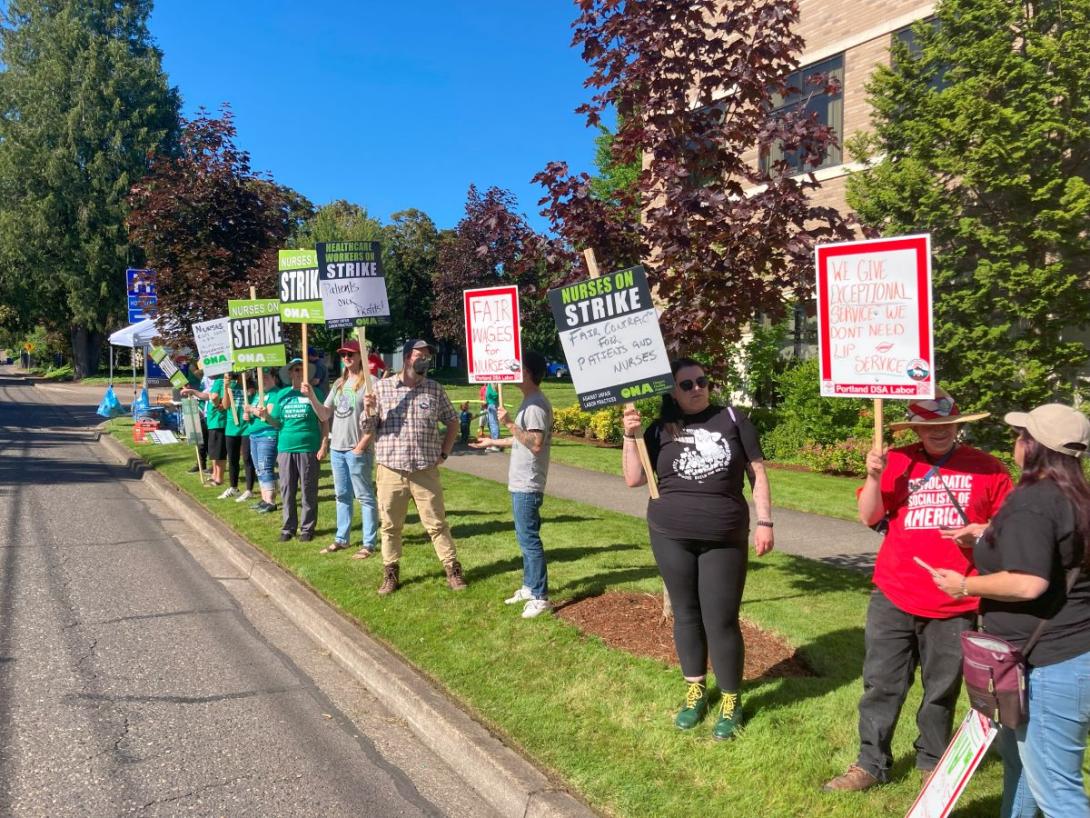
Oregon’s largest nurses’ strike will effectively continue for two more days after the union representing the nurses accused Providence of illegally preventing its members from returning to their jobs.
The three-day strike by 3,000 nurses at six Providence hospitals was scheduled to end on Friday at 6 a.m. However, the Oregon Nurses Association announced on Thursday that nurses would continue picketing in response to what they called “Providence’s selective and delayed return of some employees” to the workplace that would last until Sunday morning.
“ONA stands in solidarity with all nurses and supports their federal right to honor the picket line in the face of Providence’s actions,” reads a statement from the nurses’ union. “ONA will vigorously defend any nurse who chooses not to cross the picket line.”
Even with the strike’s end in sight, the announcement signals continued rancor between the state’s largest nurses’ union and the expansive Renton, Wash.-based hospital chain. The latest conflict stems from the timing of the strike and the length of the contracts Providence signed with temp agencies to staff its hospitals during the work stoppage.
Providence's contracts with temp agencies cover five days. The hospital system has characterized the three-day strike as a "union leadership campaign tactic" designed to extract financial pain on Providence that could put patients at risk.
“Bottom line: Union leaders knew there would be a five-day replacement period,” reads a statement from Providence. “They’re playing the media, and putting our nurses in the middle.”
The union's press release states that its members have a right to return to their jobs and it intends to file a charge with the National Labor Relations Board that will seek backpay for all affected nurses.
Five days
Seeking to pressure Providence to agree to its demands for better wages, health benefits and staffing, the nurses’ union scheduled the strike to begin Tuesday and last for three days. However, Providence is locked into five-day contracts for temporary nurses, meaning that the temps will remain on hand at its hospitals through Sunday.
That created a difficult choice for the health system: pay for two days’ worth of wages for its regular nurses after the strike ended in addition to the temps, or tell its regular nurses they weren’t needed. According to the nurses’ union, Providence chose the latter option.
“We gave them our strike days and told them our intention was to return on Friday,” nurses union spokesperson Myrna Jensen told The Lund Report Thursday morning.
Jensen said that preventing the nurses from returning to their workplace after the strike amounts to a lockout and would be the basis for an unfair labor practice complaint with the National Labor Relations Board.
As of Thursday morning, she said that nurses have not been contacted by Providence about coming in for work Friday. Nurses have not been paid while on strike and two more days without work will mean additional financial sacrifice, Jensen said.
Earlier on Thursday, Providence indicated in a statement to The Lund Report that management was still determining how many of its regular nurses it will call back on Friday to meet patient needs.
A second statement from Providence did not immediately address whether the hospital system was preventing nurses from returning to their jobs and how many employees were affected. It also indicated that most of Providence’s registered nurses work a 36-hour week that works out to $125,000 a year and that Oregon already has one of the highest pay rates for registered nurses, according to a recent analysis by Becker’s Hospital Review.
Additionally, Providence’s statement referred to a text sent by nurse union staff to members indicating that the three-day strike is intended to create “the most cost for Providence.”
The text, shared earlier with The Lund Report by a Providence spokesperson, states that the union was aware that the contracts with temporary workers last for five days. If Providence chose to lock out striking nurses, “we will shame them in the press,” the text states.
“While we’re aware of the union’s decision to continue picketing, Providence wants to be sure union leadership puts patient privacy and safety first: Please don’t allow union representatives or advocates to attempt to advance their cause by endangering our patients,” reads the statement from Providence.
The work stoppage is the third nurses' strike in the last year as the union seeks to use its post-pandemic clout to secure better wages, benefits and working conditions for its members. The most recent strike is shorter than the five-day work stoppage nurses at three Providence workplaces staged last year.

